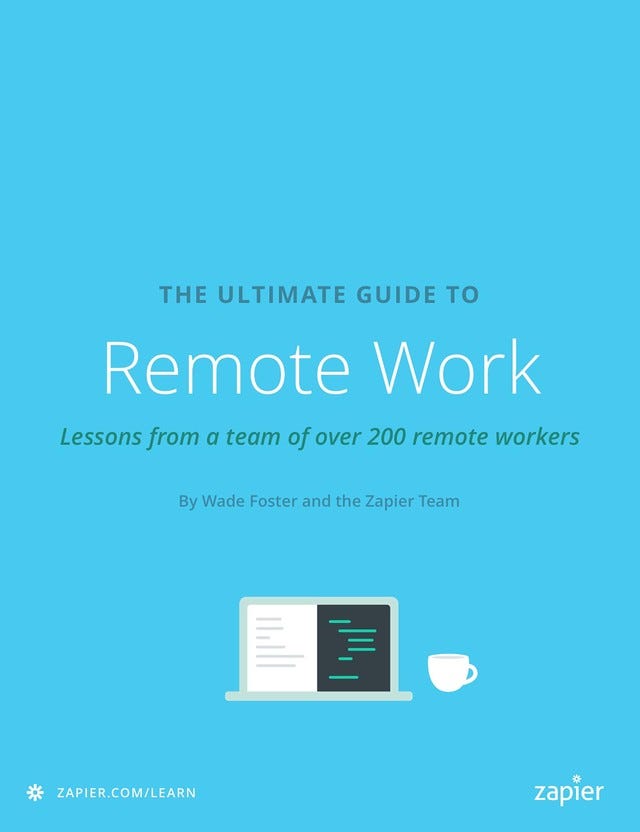✍️ Outsider Ink: Wade Foster Rewind, Remote Work Playbook, Remote Venture Deals
Outsider Ink is a bi-weekly newsletter from Outsider Inc.
The latest episode of Outsider Inc. welcomed Wade Foster, the co-founder and CEO of Zapier—a popular workflow automation platform. Wade has led the company from its humble beginnings out of a Startup Weekend hackathon to hundreds of millions of dollars in annual recurring revenue and a reported $5B valuation, all after raising just $1.3 million in outside capital—a meager amount by today’s standards. Wade provides a masterclass on capital-efficient scaling, remote-first company building, the value of adopting a “don’t hire until it hurts” ethos, and above all, the importance of following your inner compass. This episode is a barnburner 🔥. Tune in now ⤵️.
Listen: YouTube, Spotify, Apple Podcasts, Amazon Music
Follow: LinkedIn, Instagram, X, TikTok
The Ultimate Guide to Remote Work
Wade wrote the book on remote work by building Zapier through a fully-distributed model since its inception. He also literally wrote a book about it in 2019: The Ultimate Guide to Remote Work. How to Grow, Manage, and Work with Remote Teams.
Wade’s book is a concise, practical resource, offering actionable advice on hiring, communication, culture-building, and productivity in distributed teams. The guide emphasizes asynchronous workflows, managing across time zones, and maintaining team cohesion—all backed by firsthand insights from Zapier’s journey.
The podcast touched on many of the same themes—especially the importance of trust, clarity, and intentional culture in remote environments. Wade’s emphasis on asynchronous communication and clear documentation reinforces the points we discussed about remote work being not just a logistical shift, but a cultural one.
What stood out to me was the book’s tone—simple, honest, and grounded. It doesn’t overhype remote work but offers a clear-eyed look at both the benefits and the pitfalls. Its early articulation of remote-first principles shows just how ahead of the curve Wade and the Zapier team were. If you’re leading or scaling a remote team—or even just trying to work more effectively across time zones—this is a great resource.
Remote Venture Deals
Historically, venture firms—and therefore venture deals—were geographically tight-knit. The rationale is clear. Since venture deals are typically consummated through networks of trust, geographic proximity is natural. Syndication and monitoring are made easier. Physical proximity between companies and venture capitalists has been even more pronounced historically for smaller funds and emerging managers.
That was then.
In 2023, PitchBook released an analysis that confirmed what everyone in the industry already knew—that investing in companies not only outside of one’s home geography, but across the country or even the world, works perfectly fine. The COVID pandemic turbocharged this trend, but the reality is that it had been unfolding since the mid-2010s, touching all stages of venture investing.

The chart highlights a clear and profound shift in the geographic distance between venture capitalists and their portfolio companies, especially at the seed stage. This shift has created new opportunities for founders in smaller markets to access coastal capital. The report also points to the fact that the pandemic years helped seed local investor bases in many smaller markets, serving as a buffer should coastal investors retreat from early-stage deals in those regions.
The question remains about whether this geographic dispersion will persist—unfortunately, the data only goes through 2022, so we don’t know yet if things have snapped back some. My sense is yes, but not nearly to the levels seen a decade ago. It’s unclear if the next Zapier would be equally as compelled to move to the Bay Area for validation and customer connections, but it’s clear that Seed capital would be less of a concern.
Episode Highlights
To close, here are a couple of highlights from my conversation with Wade. In this first clip, Wade encourages founders to ignore the posturing that goes on in startups and venture capital, and instead, to listen to customers and your own inner voice:
And here, Wade shares some reflections on his first office hours with Paul Graham, the legendary founder of Y Combinator:
What I enjoyed most about my conversation with Wade was his deep humility and his adherence to doing what he felt was best for the company—not blindly following the advice of investors or adopting what the masses were doing. As much as leaders in Silicon Valley boast about being contrarians, Wade actually lived it.
Up Next
Tune in next week when I’ll be speaking with Linda Rottenberg, the co-founder and CEO of Endeavor—the global organization responsible for catalyzing entrepreneurship ecosystem development and investment in emerging and frontier markets worldwide. Linda rejected the conventional path in front of her, instead following her calling to build a company dedicated to lifting up outsider entrepreneurs around the world. She is a true innovator whose vision for the future was years ahead of the masses. Linda’s views on leadership and talent development provide insights you won’t want to miss.






